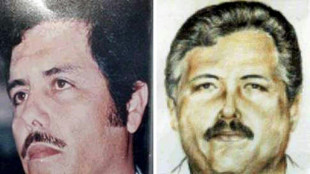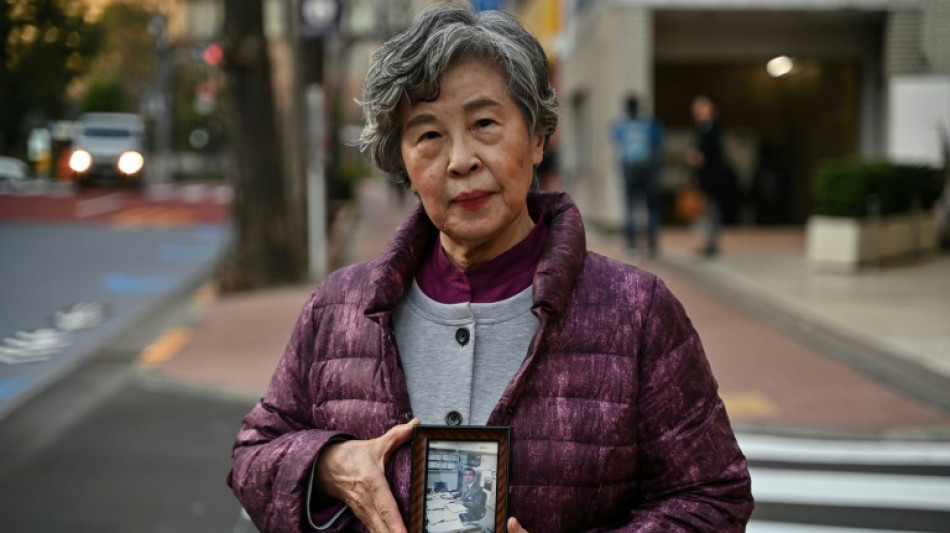
-
 Russians welcome idea of Putin and Zelensky meeting
Russians welcome idea of Putin and Zelensky meeting
-
Spanish PM says 'difficult hours' left in wildfire fight
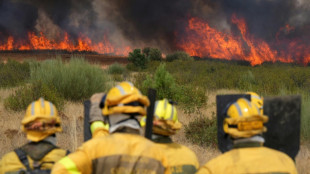
-
 Ex-owner of world's largest rhino farm arrested for trafficking
Ex-owner of world's largest rhino farm arrested for trafficking
-
South Africa ring changes after Australia defeat in Rugby Championship

-
 Sinner withdrawn from US Open mixed doubles draw
Sinner withdrawn from US Open mixed doubles draw
-
Serbia protesters accuse police of abuse and warn of 'spiral of violence'
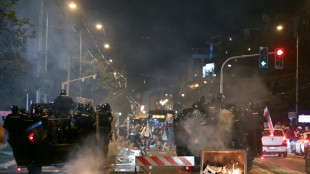
-
 Ronaldo gets Hong Kong hero's welcome, avoids Messi pitfall
Ronaldo gets Hong Kong hero's welcome, avoids Messi pitfall
-
Israel demands release of all hostages after Hamas backs new truce offer

-
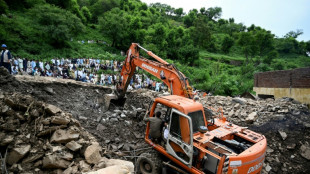 Death toll from northern Pakistan monsoon floods hits almost 400
Death toll from northern Pakistan monsoon floods hits almost 400
-
Trump says US air support possible for Ukraine security guarantee

-
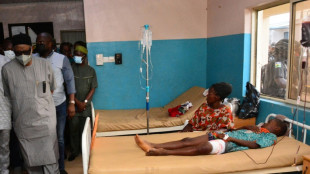 Nigerian judge delays trial over 2022 church massacre
Nigerian judge delays trial over 2022 church massacre
-
Lionesses hero Agyemang returns to Brighton on loan

-
 Stock markets cautious with eyes on Ukraine talks, US rates
Stock markets cautious with eyes on Ukraine talks, US rates
-
Record number of aid workers killed in 2024, UN says

-
 Klopp 'decisive' in move to Leipzig, says Bakayoko
Klopp 'decisive' in move to Leipzig, says Bakayoko
-
UK drops demand for access to Apple user data

-
 'Historic' final a record sell-out, says Rugby women's World Cup chief
'Historic' final a record sell-out, says Rugby women's World Cup chief
-
Verma snubbed as India name Women's World Cup squad

-
 Markram, Maharaj lead South Africa to crushing win in ODI series-opener
Markram, Maharaj lead South Africa to crushing win in ODI series-opener
-
Russia says peace deal must ensure its 'security' amid Ukraine talks

-
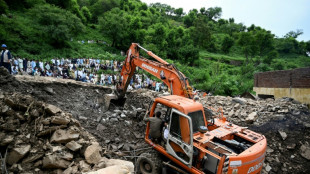 Death toll from northern Pakistan monsoon floods rises to almost 400
Death toll from northern Pakistan monsoon floods rises to almost 400
-
Pollution hotspots at England's most famous lake need 'urgent' action

-
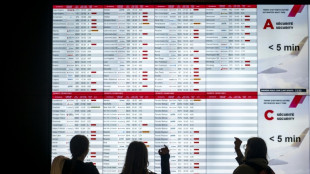 Air Canada flight attendants end strike after reaching 'tentative' deal
Air Canada flight attendants end strike after reaching 'tentative' deal
-
Stock markets cautious with eyes on Ukraine talks

-
 Azam, Rizwan demoted in contracts as Pakistan scrap A category
Azam, Rizwan demoted in contracts as Pakistan scrap A category
-
300-year-old violin to star at UK music festival

-
 Ukraine allies meet with hopes of peace talks breakthrough
Ukraine allies meet with hopes of peace talks breakthrough
-
Mediators await Israeli response to new truce offer

-
 Markram leads South Africa to 296-8 in ODI series-opener
Markram leads South Africa to 296-8 in ODI series-opener
-
Brazil asks Meta to remove chatbots that 'eroticize' children

-
 Markets cautious after Zelensky-Trump talks
Markets cautious after Zelensky-Trump talks
-
Togo tight-lipped as Burkina jihadists infiltrate north

-
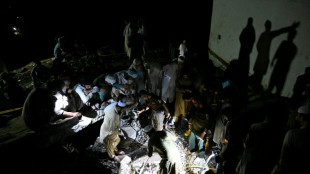 Survivors claw through rubble after deadly Pakistan cloudburst
Survivors claw through rubble after deadly Pakistan cloudburst
-
South Africa quick Rabada out of Australia ODI series with injury

-
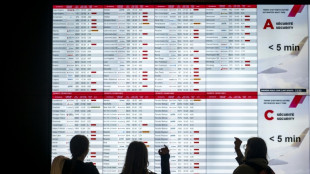 Air Canada flight attendants vow to defy back-to-work order as strike talks resume
Air Canada flight attendants vow to defy back-to-work order as strike talks resume
-
'Call of Duty' to fire starting gun at Gamescom trade show

-
 UN says record 383 aid workers killed in 2024
UN says record 383 aid workers killed in 2024
-
NYC Legionnaires' disease outbreak kills 5
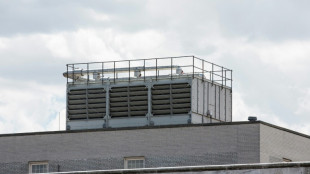
-
 Asian markets cautious after Zelensky-Trump talks
Asian markets cautious after Zelensky-Trump talks
-
Home hero Piastri to have Australian F1 grandstand named after him

-
 Maduro says mobilizing millions of militia after US 'threats'
Maduro says mobilizing millions of militia after US 'threats'
-
HK scientist puts hope in nest boxes to save endangered cockatoos

-
 Swiatek beats Paolini to clinch WTA Cincinnati Open title
Swiatek beats Paolini to clinch WTA Cincinnati Open title
-
Brazil's top court rules US laws do not apply to its territory

-
 Suits you: 'Fabulous' Zelensky outfit wows Trump
Suits you: 'Fabulous' Zelensky outfit wows Trump
-
Pro-Trump outlet to pay $67 mn in voting defamation case

-
 Downton Abbey fans pay homage to 'beautiful' props before finale
Downton Abbey fans pay homage to 'beautiful' props before finale
-
Republican-led states sending hundreds of troops to US capital

-
 Putin and Zelensky set for peace summit after Trump talks
Putin and Zelensky set for peace summit after Trump talks
-
UN debates future withdrawal of Lebanon peacekeeping force
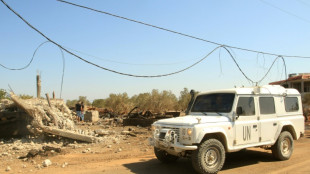

Japan victims voice fears 30 years after sarin subway attack
Three decades since Shizue Takahashi's husband and a dozen others were killed with a nerve agent on Tokyo's subway, she fears Japan could see a repeat of the doomsday cult attack.
Takahashi, whose husband worked for the metro system, told AFP it was "unbelievable" that successor groups to Aum Shinrikyo, the sect that carried out the attack, remain active today.
"In this volatile society, in Japanese society where it is not so easy any more to make a living, some say people are more prone to be attracted to cults," the 78-year-old said.
"I feel, with a real sense of crisis, that the same thing could happen again."
Aum members released sarin on five trains during morning rush hour on March 20, 1995 -- killing 13 people while a 14th victim, who suffered severe brain damage, died in 2020.
More than 5,800 others were injured in the attack, for which the wild-haired, nearly blind cult leader Shoko Asahara was executed in 2018 along with 12 disciples.
On the day, five men, one on each train, dropped bags of sarin on the floor and pierced them with umbrellas.
The assailants quickly disembarked but the carriages filled with deadly fumes as the trains drove on.
Passengers first noticed a smell that irritated their eyes and nose. Then they began to gasp for air and some collapsed, convulsing or foaming at the mouth.
As people scrambled to escape, Takahashi's husband Kazumasa, then 50, was seen carrying a bag of sarin away by hand and wiping the floor with newspapers, before keeling over.
When Takahashi arrived at hospital, "I saw so many people suffering that I could tell something disastrous had happened," she said.
"The doctors had tried very hard to resuscitate my husband... but his body was already cold. He was dead."
- Memories 'fading' -
Aum's leader Asahara, whose real name was Chizuo Matsumoto, preached that the apocalypse was coming and that murders could elevate souls to a higher realm.
Disaffected young people in Japan, including doctors and engineers who later manufactured toxins, took solace in his doctrines.
At the height of its influence, the cult counted more than 10,000 followers, mostly in Japan but also in Russia, the United States and elsewhere.
Aum has since disbanded, but its hanged guru is still worshipped in Japan by an estimated 1,600 members of successor groups.
Experts warn that the groups are reaching young recruits in secret both in person and through social media and messaging apps, where they are also spreading posts saying that Aum's crimes were misportrayed.
"It's concerning that memories of the series of heinous crimes committed by Aum Shinrikyo are fading, and that the dangers of the group are not properly understood," Justice Minister Keisuke Suzuki told reporters recently.
"This is not a story from the past. It is a present problem."
- Flashbacks -
Authorities believe Asahara ordered the subway carnage in an effort to deflect investigators who were closing in on Aum facilities.
He and several followers had stood for public office in 1990 but none were elected, something that may have pushed him to militarise the group.
Two months after the sarin attack, Asahara was arrested and later convicted of 13 major crimes including the train strike and another using VX nerve agent.
Survivors of the subway attack say they still have vision problems, flashbacks and nightmares, with some too afraid to approach stations.
On one of the targeted trains was architect Manabu Takeda, then a 31-year-old father of two small children.
"I noticed some liquid oozing out from a package wrapped in newspaper. The liquid was seeping out on the floor, which started to worry me," he told AFP.
Takeda moved down the carriage and soon got off at Kasumigaseki station in central Tokyo.
"I was incredibly fortunate" to suffer no major injury, Takeda said.
Even so, his pupils temporarily contracted and he felt his vision became darker, as if he were wearing sunglasses.
"I want people to remember the attack," said Takeda, who describes himself as now "very aware of my surroundings".
"I want to say: Are you OK with just looking at your phone, and not paying attention to what's happening around you?"
M.AbuKhalil--SF-PST

